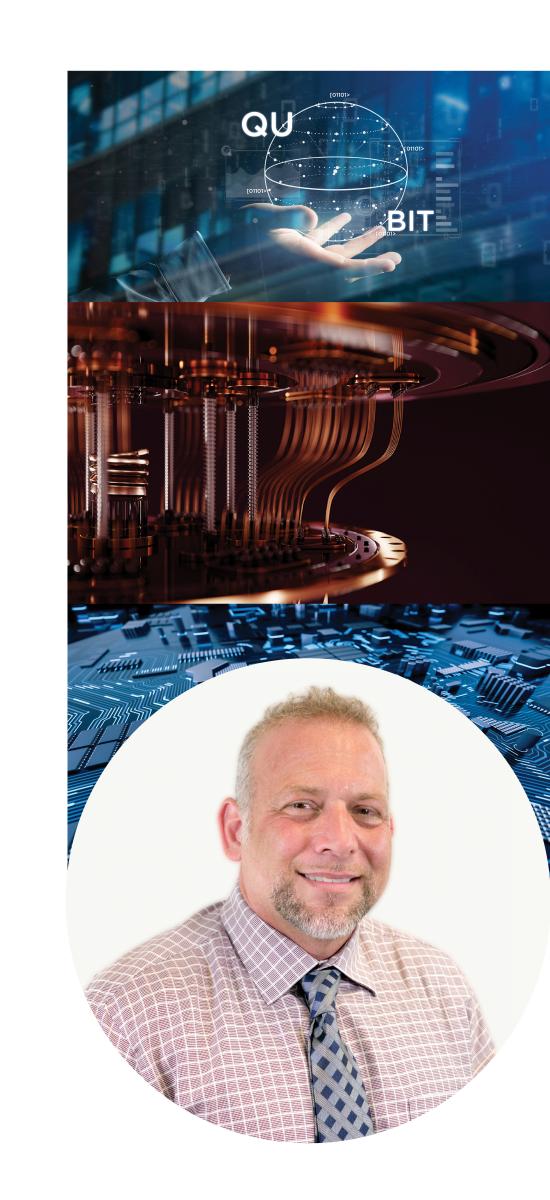September 28th, 2021 - The Nuts and Bolts (and Qubits) of Quantum Computing: BNC Academy launches NEW online training course
What is (and isn't) Quantum Computing?
Resembling the quantum states they exploit to run highly advanced algorithms, quantum computers are simultaneously known for what they are, and what they are not. To the outside world looking in, quantum computers are devices of science fiction, made of chrome-plated novelty, and are far beyond a layman's understanding. To those who drive the science behind their development, they are very real, due for real-world application, and are ultimately the product of around 120 years of research and development. One impression is universally understood, however: they have the potential to revolutionize the technological world around us.

"Real Quantum Computers only exist in films and movies."
Today’s quantum computers are expensive, not very practical, and often bizarre looking, but they do exist. With government and corporate investment, continued academic research and exploration, and the push for commercialization, it is likely
According to John Levy, President of SeeQC, an emerging R&D company invested in digital quantum computing, there are multiple approaches to developing a quantum computer: superconducting, trapped ion, photonics, and more. Algorithms have been successfully run on real world quantum computers, and the development of new algorithms for a variety of applications is ongoing.
"Quantum Computers won't affect my day to day life."
Comparing quantum and classical computing is an exemplary apples and oranges comparison, but it is not cost or size that ultimately obscures their development from the average consumer.
Quantum computing focuses on the principles of quantum theory, modern physics that explain the behavior of matter and energy at this atomic and subatomic level. Quantum computing makes use of quantum bits, superposition, and entanglement to perform data operations. Meanwhile, classical computers and their components are consistent with the laws of physics regarding position and momentum. However, they are insufficient for solutions at atomic and subatomic microscopic levels, governed by quantum physics, where position and momentum cannot describe their state.
As quantum computing continues to take hold, it has the power to be a game changer across many industries. While it will not necessarily be powering phones, tablets, and personal computers, quantum computing has the unique ability to provide industry improvements that classical computing cannot, and those improvements will be profoundly felt in the world.
"Quantum Computing cannot be commonly understood."
The mechanics that power quantum computers can be difficult to follow, but are not so convoluted as they first appear. Any initial confusion comes by the fact that the rules work differently here than what common sense might dictate. Qubits, superposition, entanglement, and coherence are the critical principles behind quantum computational models. They work together in a system, and permit the calculation of complex problems in a relatively short time. Their processing abilities will be used to optimize defense, finance, and communication systems; as these developments find purposes in industry, the ease of access to information regarding them will advance as well.
It's this idea that has led us to create our QC01 - The Nuts and Bolts (and Qubits) of Quantum Computing course. It is your opportunity to get a head start on learning the facts of quantum computing.
What does our QC01 Offer?
You will get to see quantum computing from its beginnings to today, what it is and what it isn’t, who the players are, how you can get your hands on it, what you can potentially expect in the future, and even how to get a job in the field. This course will introduce you to concepts without diving in too deep. We will explain how quantum computing works, and how it works differently than traditional computing based on bits.
We will look at:
-
What quantum computing is—a slightly deeper dive into the technology
-
How quantum computing and classical computing differ
-
A brief look at quantum mechanics
-
The hardware levels involved
-
An overview of quantum computing models and platforms
-
The applications that will thrive
-
What the future will likely hold
-
How to gain hands-on experience
-
What career paths are available
Just how many qubits will it take for quantum computers to reach their potential? When will they enable rolling out the right pharmaceuticals, establishing the ultimate cybersecurity and cryptography solutions? When will it be able to fulfill the promise of being the ultimate optimization tool? Is there a tool that can tell us how the number of qubits will explode in an orderly fashion—similar, for example, to Moore’s Law? Enroll now and gain early valuable insights into these exciting questions!
